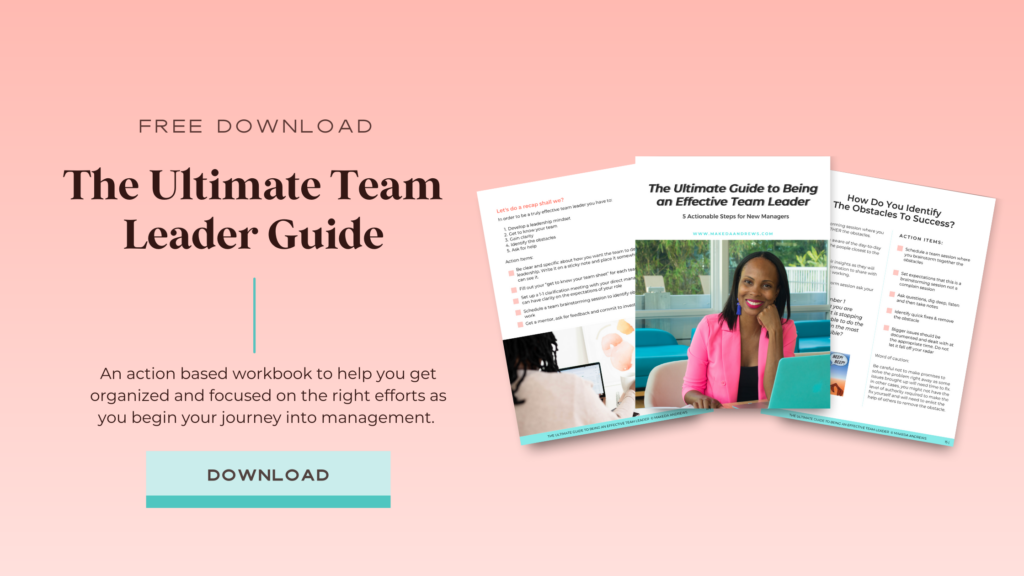How To Create A Work Plan
Hi, I'm Mak. I'm a leadership coach for new managers who knows what it's like to be filled with overwhelm, self-doubt and terror that I’d let everyone down. My Story
FREE MICROCAST
How to Become an Effective Leader so You Can Build a High Performance Team
Learn how to delegate with confidence, navigate those tricky conversations (even for introverts!), and finally stop relying on Google to do your job.
Netflix < MakTV
THE YOUTUBE CHANNEL
No but really. This is the kinda content that’s actually healthy to binge. In fact, you become more of an awesomesauce manager with every video you watch.
Updated September 26th, 2023

As a manager, you cannot overstate when it comes to learning how to develop a work plan. In today’s episode of MakTV I will be explaining how to create a work plan, what a work plan is as well as the four essentials to developing a work plan. All right then let’s get into it!
Before moving forward, I highly recommend downloading my FREE Guide to Being An Effective Team Leader, where you’ll learn the five actionable steps new managers must take to gain clarity, build relationships, and lead their new teams effectively.

But first, to really help you stand out in your new role I highly recommend downloading the New Manager Starter Kit. A free downloadable interactive guide to help you show up and stand out and take the right action steps.
What is a Work Plan?
Simply put a work plan is an effective document that helps you to manage your projects in order for you to accomplish desired goals and targets.
A good work plan should be able to tell you where you are, where you were and where you ought to be ‘project wise’.
When creating a work plan you should ensure it aids in the realization of positive outcomes. It should consist of all the required steps to achieve a key goal by setting demonstrable objectives and measurable deliverables.
How to Create a Work Plan
Let’s dive into the key things you should do from the moment your boss asks you to take charge of a project.
1. Get Clarification:
You absolutely need defined goals and objectives to avoid working blindly.
I know that for myself one of the biggest mistakes I made multiple times was not getting clarity on what my expectations. I made a lot of assumptions and then ended up running down a path I shouldn’t have, so in order to spare you from that kind of heartache I highly suggest you first start off by getting yourself some clarity.
Listen if it’s one thing I’ve learned it’s that you cannot hit a target you cannot see.

In order to help you get some clarity I would suggest setting up a meeting with your boss by asking the following questions:
- What are the deliverables? So specifically, what do they want to see at the end of this project and what does success look like. You want to walk away knowing exactly what you need to do; that’s only how you will know if you got it right.
- How much autonomy do I have? The reason this is important is because this will affect your timeline. If your boss is expecting to be in the loop about everything – then delivery will take longer. That’s not necessarily a bad thing; it’s just something that you have to know in order to plan effectively.
- What is the timeline of expected delivery? You need to not just know a specific date but the time as well, because Friday at end of day to you might mean Friday morning for someone else; so get clear on the specifics of the expected date as well as if there is expectation of check points. Maybe you have autonomy but you need to make check points every couple months, or at certain milestones to ensure that everyone is still heading down the right path.
2. Determine your resources and how you want to develop this work plan
Next step is to figure out what the resources you have are; this could be finances, docs, buildings, rooms, consultants.
So what’s the budget, are there any constraints that may get in the way of achieving your goals and objectives.
What are the possible restrictions to your authority to make certain decisions, as well as how many team mates can I work along with to accomplish this goal.
Now, I personally don’t love referring to people as resources but in this case when it comes to project plan you do have to know exactly who you might be able to work with and might not be able to work with so in this context your team members are a resource.
The second part of that is to decide on how you want to develop the project plan – independently or collaboratively.
There are pros and cons to both and you might be stronger in one than the other; for me – I really enjoy working collaboratively but I realize that working independently can work well too to a certain extent.
Here are a few things you want to consider:
Working Independently:
Pros: You can decide quickly how or what you will be delegating, there is more control so the entire process moves along quicker.
Cons: Without the input of others you might be missing some key elements
Working Collaboratively:
Pros: Working collaboratively gives you an opportunity to develop your leadership skills, you will get more ideas, you can develop the team and he ensures that the tasks people take over will have greater commitment as they are more invested.
Cons: A lot of cooks in the kitchen can lead to mistakes and of course things taking a lot longer.
I personally like a combination of working both independently and collaboratively. Starting out on my own with big picture so we have some sort of roadmap first – then involving the team on the rest.
Honestly everyone works differently and I’m not going to suggest that you do one or the other; but you do have to decide from the get go how you want to proceed.
3. Reverse Engineer the Project
How do you do this? Picture the end product of the project, or in other words start with the end in mind.
It is far easier to think first about the outcome than to think in terms of steps to get there.
You want to think of the supporting action steps and decisions you need to make in order to get to the destination.
Now, I don’t want you to think of the minutia – I’m just talking about broad strokes and what are the things to do.
A great project management tool to use to track all of this is Trello. It’s free to use and also just simple to use.
It’s based on a card system and it’s set up the exact way when it comes to a project – goal – objectives and tasks.
It allows for collaboration and my favourite automation that will just make your life a whole lot easier. If you are interested in Trello check it out here: CLICK HERE
4. Identify the obstacles
So as we know things happen no matter how much you plan, you cannot think of every obstacle; but there are certain things that you can anticipate and plan how you are going to deal with it.
For example people get sick all the time its unexpected, and if certain tasks rest on only one person then it can throw off the entire project.
So you could plan with that foresight to have one person that has a handle on what and where everyone is at so that they can pick up the baton if someone is out. Or you could have a record where everyone tracks what they are doing so that if someone is out sick – you are updated on what’s done and what needs to completed.
5. Pad your time
When working out a work plan, you should put into consideration how much of your time would be dedicated to the project and the possible completion time.
Strictly follow laid out schedules, remember time is money; each team member should have a specific timeline to present deliverables.
I cannot tell you how many times I made the mistake of underestimating how much time something would take, I would always say – oh this is only going to take me a week.
Two weeks later I’m still in the thick; if you think something is going to take you only a week, give yourself an extra couple days.
Things happen, and sometimes when you are relying on someone else for an outcome you can’t predict what will happen.
So its better to give yourself some extra time to recover if you get diverted unexpectedly.

May 29, 2020